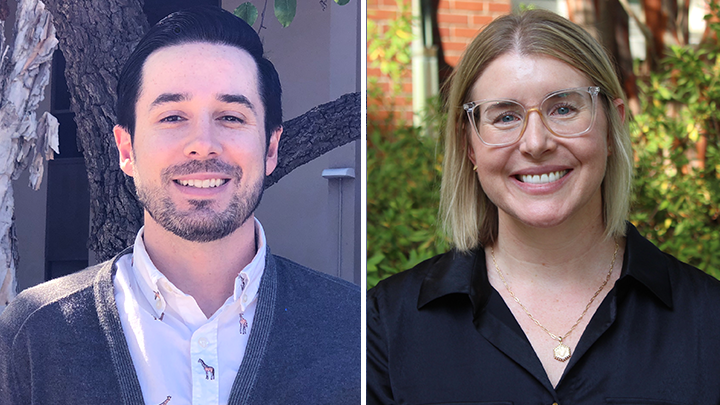Tuesday, September 10, 2024
The National Institute of Mental Health (NIMH) awarded San Diego State University psychology professor Aaron Blashill and Auburn University assistant professor of psychological sciences Tiffany Brown up to $5 million in grant funding to develop and provide the first identity-affirming eating disorder treatment for LGBTQIA+ patients.
The Promoting Resilience to Improve Disordered Eating (PRIDE) treatment is an innovative, virtually delivered treatment program that targets identity-related stressors, including internalized stigma and low confidence in coping with stress, that may increase the risk of developing and maintaining an eating disorder.
Eating disorders are one of the deadliest psychiatric disorders. LGBTQIA+ individuals are up to three times more likely to develop an eating disorder and more likely to drop out of treatment, compared to their non-LGBTQIA+ peers.
“Even when available, many LGBTQIA+ people across the country feel uncomfortable accessing treatment, for fear of discrimination or lack of understanding,” Brown said. “That is why we are so excited and honored to receive this grant from the NIMH to evaluate a treatment that integrates approaches that affirm and support LGBTQIA+ identities.”
Current eating disorder treatment models do not consider identity-related stress as an underlying motivator of disordered eating. The PRIDE treatment will deliver identity-affirming treatment, which addresses the specific needs of the LGBTQIA+ population, virtually to reach members of this high-risk group across the country.
“Sexual and gender minorities, unfortunately, burden a disproportionate share of many mental health conditions, including eating disorders, so we saw a need there,” Blashill said. “Folks can struggle to find good evidence-based care for eating disorders, so this intervention, because it’s virtually delivered, could give access to care to people who may otherwise never be able to receive it.”
After conducting a successful small pilot study that saw a 75% remission rate among patients treated with PRIDE, Brown and Blashill will now use the NIMH’s support to test and refine the PRIDE treatment on a larger scale over the next two years. If the program succeeds in reducing stigma and increasing confidence in coping with stress during that time, the NIMH will fund a larger follow-up trial comparing the effectiveness of PRIDE to other treatments for another three years.
The team said that because minority stressors undergird many of the disparities across a range of mental health conditions, if the study proves effective, it could potentially help treat other types of psychiatric conditions in LGBTQIA+ individuals nation- or even worldwide.
Brown leads the Appearance Concerns, Eating, Prevention and Treatment (ACCEPT) Lab and codirects the Auburn Eating Disorders Clinic (AEDC). Through both, she leads a cyclical effort to investigate, test and improve eating disorder treatment for traditionally underserved populations.
Blashill is the director of the Body Image, Sexuality, and Health (BISH) lab at SDSU. The lab explores the role body image plays in influencing eating disorders and other health behaviors, with a focus on health disparities among sexual and gender minority individuals.
Learn more about the researchers’ person-centered mental health treatments at Auburn’s College of Liberal Arts and SDSU’s College of Sciences.
Research discussed in this story is supported by NIMH of the National Institutes of Health under award number R61MH133710. The content is solely the responsibility of the authors and does not necessarily represent the official views of the National Institutes of Health.

